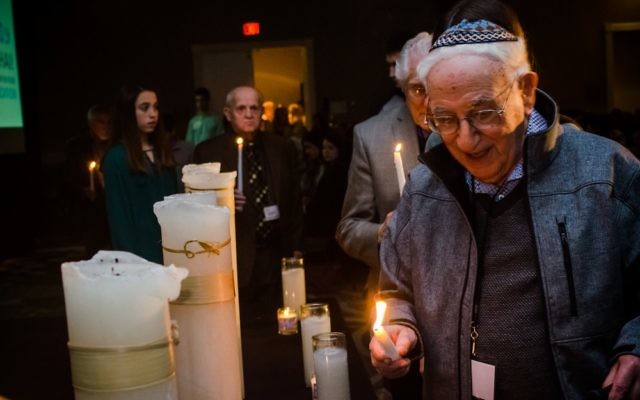Lucky Night for Atlanta
By Rena Gray
A man who considers himself lucky to be one of the youngest survivors of Auschwitz helped Holocaust education and awareness organization Am Yisrael Chai mark 71 years since the liberation of the Nazi death camp Sunday night, Jan. 24, at the Westin Atlanta Perimeter North in Sandy Springs.
“Courage and Compassion: A Lucky Child Survives Auschwitz” came three days before International Holocaust Remembrance Day. In addition to keynote speaker Thomas Buergenthal, the “lucky child” who grew up to be a human rights advocate, the event was dedicated to survivors of Auschwitz and highlighted the experiences of survivors who live in Atlanta.

Survivors and their family members lighted candles in tribute to those who perished in the Holocaust. After singing the American and Israeli anthems, the crowd of more than 900 people was addressed by Am Yisrael Chai President Andrea Videlefsky, Israeli Deputy Consul General Ron Brummer, and Rabbi David Blumenthal, a Jewish studies professor at Emory University.
Buergenthal began his narrative by addressing the question of why he named his memoirs “A Lucky Child.” How could a survivor of Auschwitz refer to himself as lucky?
While the family was in Poland waiting for visas that would not be of much use, a friend of Buergenthal’s mother persuaded her to seek the advice of a fortuneteller, who predicted terrible things in the family’s future.
“You didn’t have to be a chochom in 1939 to know that things are going to be bad for the Jews,” Buergenthal said to audience laughs.
But he said the fortuneteller continued, “You have a son, a lucky child, and he’s going to get through it all.”
Buergenthal’s account, though sprinkled with lucky encounters, was not without Holocaust horrors. He shared few examples, however, scraping the surface enough to set the tone but choosing to focus on the instances that led to his survival.
One of his earliest fortuitous experiences occurred at the liquidation of the Kielce ghetto, where Buergenthal and his parents were sent from their hometown. As was common in camps throughout the Holocaust, children were the first to be eliminated, and here was no exception.
When it became clear that the Germans were separating the children from the rest of the group, Buergenthal, at his father’s suggestion, boldly approached the German commander to assert that he could work. “And he let me live.”
His luck followed him to Auschwitz. Normally, new arrivals at the camp immediately went through a selection process. The children, the elderly and the sick were sent to the gas chambers.
But because Buergenthal and his group came directly from work camps, they were assumed to be qualified for work, and there was no selection. “People might call me meshuggana for saying I was lucky when I came to Auschwitz,” he said, “but I was lucky.”
As one of the youngest Auschwitz survivors, Buergenthal devotes as much time as he can to publicizing his story and the urging his audience to seek out the stories of others. “Everybody has a different story, and it’s all the same story,” he said. “I feel that those of us who survived the camps really have an obligation to make … a commitment to make sure that these things don’t happen again, not only to Jews, but to other people in the world.”





comments